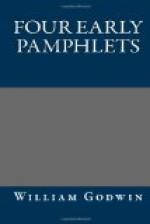Having thus cleared myself from the suspicion of any sinister view, I cannot here refrain from presenting you with a peace-offering. Had it been in my power to procure gums more costly, or incense more fragrant, I would have rendered it more worthy your acceptance.
It has been a subject upon which I have often reflected with mortification, that the world is too apt to lay aside your lucubrations with the occasions that gave birth to them, and that if they are ever opened after, it is only with old magazines by staid matrons over their winter fire. Such persons are totally incapable of comparing your sentences with the maturer verdict of the public; a comparison that would redound so much to your honour. What I design at present, is in some measure to remedy an evil, that can never perhaps be entirely removed. As the field which is thus opened to me is almost unbounded, I will confine myself to two of the most striking examples, in Tristram Shandy, and the Rosciad of Churchill.
In the Monthly Review, vol. 24, p, 103, I find these words:
“But your indiscretion, good Mr. Tristram, is not all we complain of in the volumes before us. We must tax you with what you will dread above the most terrible of all insinuations—nothing less than DULLNESS. Yes, indeed, Mr. Tristram, you are dull, very dull. Your jaded fancy seems to have been exhausted by two pigmy octavos, which scarce contained the substance of a twelve-penny pamphlet, and we now find nothing new to entertain us.”
The following epithets are selected at random. “We are sick—we are quite tired—we can no longer bear corporal Trim’s insipidity—thread-bare—stupid and unaffecting—absolutely dull—misapplication of talents—he will unavoidably sink into contempt.”
The Critical Review, vol II, p. 212, has the following account of the Rosciad:
“It is natural for young authors to conceive themselves the cleverest fellows in the world, and withal, that there is not the least degree of merit subsisting but in their own works: It is natural likewise for them to imagine, that they may conceal themselves by appearing in different shapes, and that they are not to be found out by their stile; but little do these Connoisseurs in writing conceive, how easily they are discovered by a veteran in the service. In the title-page to this performance we are told (by way of quaint conceit), that it was written by the author; what if it should prove that the Author and the Actor[A] are the same! Certain it is that we meet with the same vein of peculiar humour, the same turn of thought, the same autophilism (there’s a new word for you to bring into the next poem) which we meet with in the other; insomuch that we are ready to make the conclusion in the author’s own words:
[Footnote A: The Actor, a Poem, by Robert Lloyd, Esq.]




